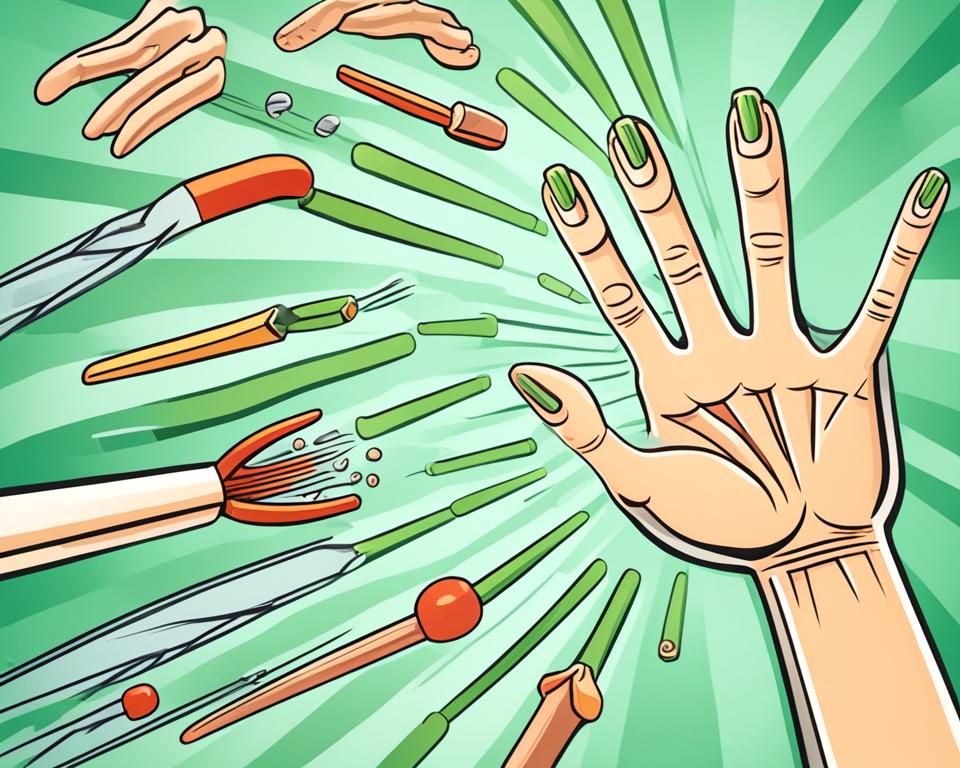Have you ever wondered why your nails seem to grow at lightning speed? It can be intriguing to witness the rapid growth of our nails and wonder what causes it. In this article, we will explore the factors that contribute to fast nail growth, understand the nail growth cycle, and uncover the patterns behind this phenomenon.
Key Takeaways:
- Genetics, overall health, and age are the primary factors that influence nail growth rate.
- Nails have a growth cycle consisting of the anagen, catagen, and telogen phases.
- A balanced diet rich in essential nutrients promotes healthy and fast nail growth.
- Other factors such as blood circulation, hormones, trauma or injury, and the environment can also affect nail growth.
- Regular maintenance, hydration and moisturization, and gentle nail care can help manage rapid nail growth.
Nail Anatomy and Growth Cycle
Understanding the anatomy of your nails and their growth cycle is essential to better care for them. Nails, which are composed of keratin, serve as a protective covering for your fingertips. They have a complex structure that involves different components, including the nail matrix, nail plate, nail bed, and cuticles.
The nail matrix, located at the base of the nail, is responsible for the production of new nail cells. These cells then push out the older cells, forming the nail plate that we see. The nail matrix is crucial in determining the shape, size, and thickness of the nail.
The nail bed, situated underneath the nail plate, is the area that connects the nail to the blood supply. It provides nutrients and oxygen to the growing cells, contributing to nail health and growth.
Another important feature of the nails is the cuticles. Cuticles are the thin strips of skin that overlap the base of the nail plate. They act as a protective barrier against bacteria, fungus, and debris, preventing infections and promoting overall nail health.
Nails undergo a growth cycle with different phases. The growth cycle consists of three stages: the anagen phase, the catagen phase, and the telogen phase.
The anagen phase is the active growth phase where new nail cells are produced in the nail matrix. This phase typically lasts for two to three months.
The catagen phase is a transitional stage where the growth slows down, and the nail stops producing new cells. It lasts for about two to three weeks.
The telogen phase is the resting phase where the nail stops growing completely. During this phase, the nail plate is fully formed, and it remains in place until it is pushed out by the new cells produced during the next anagen phase. The telogen phase lasts for approximately two to four months.
Understanding the intricate anatomy and growth cycle of your nails can help you take better care of them and maintain their health and appearance. Now that we have covered the basics of nail anatomy and growth cycle, let’s explore the genetic factors that contribute to fast nail growth in Section 3.
Genetic Factors
When it comes to the speed at which nails grow, genetics play a significant role. This means that if your parents or grandparents have fast-growing nails, there is a higher chance that you have inherited this trait as well. Your genetic predisposition not only determines the speed of nail growth but also influences the baseline growth rate and thickness of the nail plate.
Understanding the genetic component of nail growth can provide valuable insights into why some individuals have fast-growing nails compared to others. This inherited trait can be observed in families where multiple generations exhibit similar nail growth patterns. By studying genetic predisposition, scientists have made significant strides in unraveling the mysteries surrounding nail growth and identifying the genes responsible for regulating this process.
This inherited trait related to fast-growing nails is a fascinating area of research in the field of genetics. By examining the genes involved, scientists hope to gain a better understanding of why some individuals have faster nail growth rates than others. This knowledge can contribute to further advancements in cosmetic and medical treatments related to nail health and maintenance.
Genetic Factors Affecting Nail Growth
| Genetic Factors | Effects on Nail Growth |
|---|---|
| Inherited Trait | Fast-growing nails |
| Baseline Growth Rate | Increased nail growth speed |
| Nail Plate Thickness | Thicker nails |
This table highlights the genetic factors that influence nail growth. Inherited traits like fast-growing nails, baseline growth rate, and nail plate thickness can all be linked to genetic predisposition. Understanding these genetic factors is crucial in comprehending why individuals experience differences in nail growth rates, and it opens up possibilities for personalized treatments and care tailored to individual needs.
Nutrition and Nail Growth
When it comes to promoting healthy and fast nail growth, nutrition plays a crucial role. Consuming a balanced diet that is rich in essential nutrients can significantly benefit your nails. Let’s explore the key nutrients that promote nail growth:
1. Biotin
Also known as vitamin H, biotin is essential for nail health and growth. It helps to strengthen the nail structure and prevent brittleness.
2. Protein
Protein is the building block of nails. Including protein-rich foods such as lean meat, fish, dairy, and legumes in your diet can provide the necessary amino acids for nail growth and repair.
3. Vitamins A and D
Vitamins A and D are vital for maintaining healthy nails. Vitamin A promotes cell turnover and growth, while vitamin D helps in the absorption of calcium, which contributes to nail strength.
4. Zinc and Iron
Zinc and iron are essential minerals that support healthy nail growth. Zinc aids in the formation of keratin, the protein that makes up the nails, while iron helps in delivering oxygen to the nail cells.
To promote nail growth, incorporate the following foods into your diet:
- Eggs
- Nuts and seeds
- Legumes
- Leafy greens
- Fatty fish
- Lean meats
- Low-fat dairy products
In addition to these nutrients, staying hydrated and drinking enough water is essential for overall nail health. Hydration helps in maintaining nail flexibility and preventing dryness and brittleness.
By ensuring you consume a well-rounded diet that includes these essential nutrients and maintaining proper hydration, you can support nail growth and achieve healthy, strong nails.
Other Factors Influencing Nail Growth
In addition to genetic factors and nutrition, several other factors can influence nail growth. These factors include blood circulation, hormones, overall health, age, trauma or injury, and the environment.
Blood Circulation: Good blood flow and circulation are essential for faster nail growth. Adequate blood circulation ensures that the nail bed receives the necessary nutrients, which promote nail growth and health.
Hormones: Hormonal fluctuations can impact nail growth. Changes in hormone levels, such as during puberty, pregnancy, or menopause, may affect the speed at which nails grow.
Overall Health: The overall health of an individual plays a significant role in nail growth. Certain health conditions, such as thyroid disorders or nutritional deficiencies, may affect the rate of nail growth.
Age: Age can also influence nail growth. Generally, nails tend to grow faster in younger individuals compared to older individuals.
Trauma or Injury: Trauma or injury to the nail bed can disrupt the nail growth cycle. Any damage to the nail bed, such as a fracture or infection, may result in slower nail growth or even nail abnormalities.
Environment: Environmental factors like temperature and climate can affect nail growth. Extreme cold or hot temperatures, as well as exposure to harsh chemicals or excessive moisture, can impact the rate at which nails grow.
Understanding these various factors can help individuals better manage their nail growth and maintain overall nail health.
Factors Influencing Nail Growth
| Factor | Influence on Nail Growth |
|---|---|
| Blood Circulation | Promotes faster nail growth by providing necessary nutrients |
| Hormones | Fluctuations in hormone levels can impact nail growth |
| Overall Health | Health conditions or nutritional deficiencies may affect nail growth |
| Age | Nails tend to grow faster in younger individuals |
| Trauma or Injury | Damage to the nail bed can disrupt the growth cycle |
| Environment | Temperature, climate, and exposure to chemicals can influence nail growth |
Managing Rapid Nail Growth
To effectively manage rapid nail growth, it is important to incorporate regular maintenance, hydration and moisturization, a balanced diet, gentle nail care, and restorative care into your nail care routine.
Regular Maintenance
Regularly trimming your nails helps maintain their length and prevent them from becoming overly long. Use a nail clipper or nail scissors to trim your nails straight across and avoid cutting them too short, as this can lead to discomfort or injury.
Hydration and Moisturization
Keeping your nails hydrated and moisturized is crucial for their overall health and strength. Apply a moisturizing hand cream or cuticle oil regularly to nourish the nails and prevent them from becoming dry and brittle.
Balanced Diet
A balanced diet plays a significant role in promoting healthy nail growth. Ensure you consume foods rich in essential nutrients such as biotin, protein, vitamins, and minerals. Include foods like eggs, nuts and seeds, leafy greens, and fish in your diet to support optimal nail health.
Gentle Nail Care
Treating your nails with care is essential to avoid damage and promote their growth. Avoid using harsh chemicals, such as acetone-based nail polish removers, as they can strip the nails of their natural oils. Opt for non-acetone removers and gentle nail polish formulas to minimize the risk of nail damage.
Restorative Care
In some cases, additional restorative care may be beneficial to manage rapid nail growth. Consider using nail strengthener or nail growth serums that contain nourishing ingredients like vitamins and minerals to support nail health and promote optimal growth.
| Benefits of Managing Rapid Nail Growth | Methods |
|---|---|
| Prevents nails from becoming too long | Regular nail trimming |
| Maintains nail hydration and prevents dryness | Moisturization with hand cream or cuticle oil |
| Promotes overall nail health and strength | Following a balanced diet |
| Minimizes the risk of nail damage | Gentle nail care practices |
| Supports nail growth and health | Restorative care products |
Conclusion
Fast nail growth is influenced by genetic factors, overall health, and various lifestyle choices. Genetics play a significant role in determining the speed at which nails grow, with traits often passed down through generations. Good nutrition, including essential nutrients like biotin, protein, and vitamins, promotes healthy and rapid nail growth. Adequate blood circulation, balanced hormones, and overall well-being also contribute to the rate of nail growth.
While rapid nail growth is generally a positive sign of good health, it’s essential to monitor any unusual changes or concerns. Consultation with a healthcare professional is recommended to address any underlying health conditions or abnormalities. Similarly, the same principles that affect nail growth also apply to hair growth, with genetics, nutrition, and overall health influencing the rate at which hair grows.
In conclusion, achieving rapid nail and hair growth involves a combination of genetic factors, nutrition, and maintaining overall health. By implementing a balanced diet, proper hydration and moisturization, and adopting gentle nail and hair care practices, individuals can promote healthy and accelerated growth. Paying attention to these factors, alongside regular maintenance and restorative care when necessary, ensures the optimal health and appearance of nails and hair.


